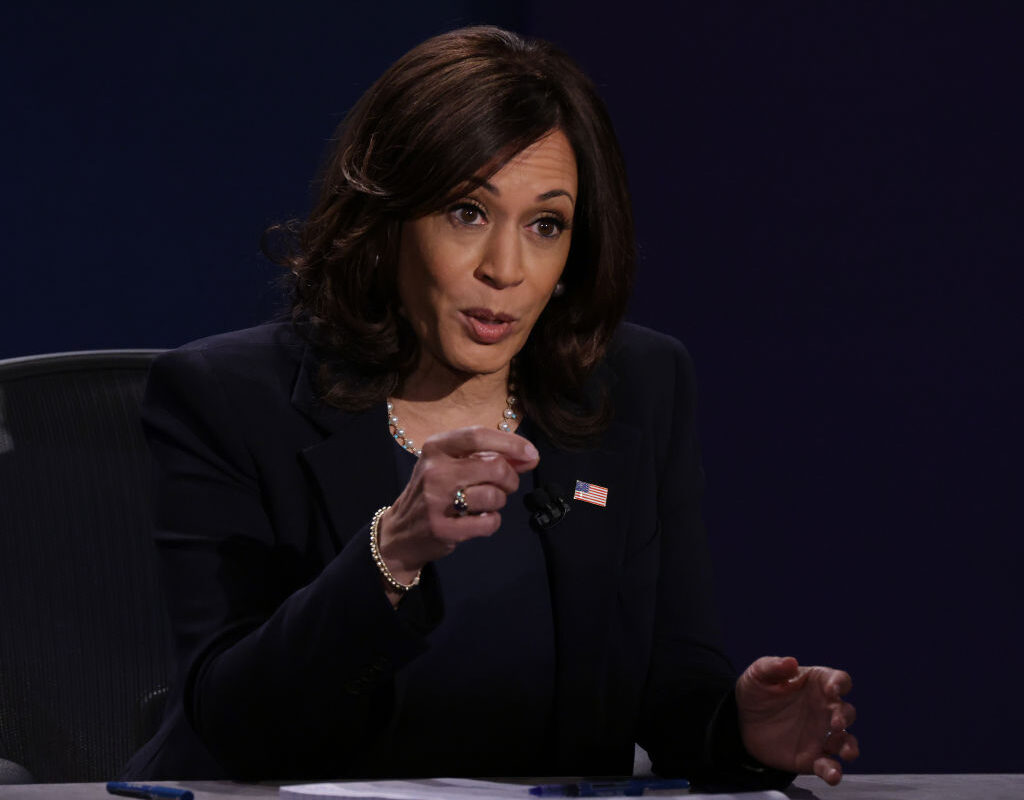VP Kamala Harris Shouldn’t Have To Prove Her Blackness
Source: Alex Wong / Getty
Janet Jackson recently stirred controversy by questioning Vice President Kamala Harris‘ racial identity during an interview with The Guardian. In the piece, Janet mistakenly claimed, “She’s not Black. That’s what I heard,” citing misinformation that Harris’ father was white.
Although Jackson quickly issued an apology, the broader conversation about the vice president’s identity reignited – yet again.
The beloved singer’s comments came during a section of the publication’s interview that discussed what the writer described as “the state of the nation.” The writer, Nosheen Iqbal, felt that Jackson previously brought politics into pop culture through her infamous “Rhythm Nation” hit, which highlighted racism, poverty, and equality, among other topics.
Janet fans will remember “Rhythm Nation’s” lyrics (in part):
With music by our side to break the color lines
Let’s work together to improve our way of life
Join voices in protest to social injustice
A generation full of courage, come forth with me
People of the world today, are we looking for a better way of life? (Sing!)
Because of the progressive nature of Jackson’s music, the reporter decided to ask her about the current election, saying that “America could be on the verge of voting its first Black female president.”
Janet Jackson quickly issued an apology for her incorrect statement about VP Kamala Harris, but the impact of her words remains.
Jackson responded in disagreement. She said that the vice president is not Black. Jackson said she heard something different.
“She’s not Black. That’s what I heard, that she’s Indian. Her father’s White. That’s what I was told,” she reportedly said. “I mean, I haven’t watched the news in a few days. I was told that they discovered her father was White.”
While Jackson’s comments have come and gone in less than 48 hours, the impact of her words remains.
Jackson is one of the most respected Black women in the culture. Her impact transcends music, acting, dancing, and everything in between. Her name alone spurs attention, influence, and a listening ear. Jackson is a Black woman powerhouse.
So her comments – whether ill-informed or not – have the potential impact of spreading misinformation.
But the truth is, Jackson’s comments aren’t the first time VP Harris’ identity has been questioned. The topic constantly comes up, finding its way into the “news of the day,” trending topics, and hashtags.
Despite her pride in her Black and Indian heritage—her father, Donald Harris, is Jamaican, and her mother, Shyamala Gopalan, was Indian—public perception often reduces VP Harris’ identity to one or the other (or neither at all).
As the first Black and South Asian woman to serve as vice president, Harris has constantly defended her identity as a Black woman.
What makes this conversation even more exhausting is that VP Harris isn’t just Black, she isn’t just proud, but she loudly claims her culture. Harris has been a longtime member of Black spaces.
She is a graduate of Howard University, an HBCU. She is also a proud member of the oldest Sorority founded for and by Black women, Alpha Kappa Alpha Sorority, Incorporated. VP Harris also doesn’t shy away from comments about her background, heritage, or race.
Despite this, she is still subject to questions that no other candidate would face regarding their racial identity (repeatedly). If she were a White male candidate, no one would be pulling out family trees and debating lineage. Yet for the VP, there’s always an asterisk beside her race. This is true whether it’s conservatives questioning her or even members of our own community.
Vice President Kamala Harris should not have to continue proving her Blackness. Period.
Said another way, the vice president shouldn’t have to keep proving her race to validate her presence (or purpose) in running for president.
No matter which candidate one chooses to vote for, their qualifications, platform, and leadership, among other things, are what should be discussed. And when it comes to VP Harris? Her presence, accomplishments, and dedication to public service speak louder than anyone’s opinion on her skin color.
Harris is one of the most decorated, educated, experienced, and knowledgeable candidates in the presidential race. She has paid her dues on the city, state, region, national, and global levels.
So why are folks still bickering over the color of her skin?
In a time when women of color – and in this case, Black women – already face relentless scrutiny, the conversation should shift toward solidarity and unity. We should celebrate our wins, collective accomplishments, and historic milestones.
SEE ALSO
Arkansas Gov. Sarah Huckabee Sanders, Says Kamala Harris Can’t Be ‘Humble” Because She’s Childless
The post VP Kamala Harris Shouldn’t Have To Prove Her Blackness—Janet Jackson’s Recent Comments Show Why appeared first on HelloBeautiful – Fashion, Beauty, Lifestyle and Hair Care for Black Women.
The post VP Kamala Harris Shouldn’t Have To Prove Her Blackness appeared first on NewsOne.

